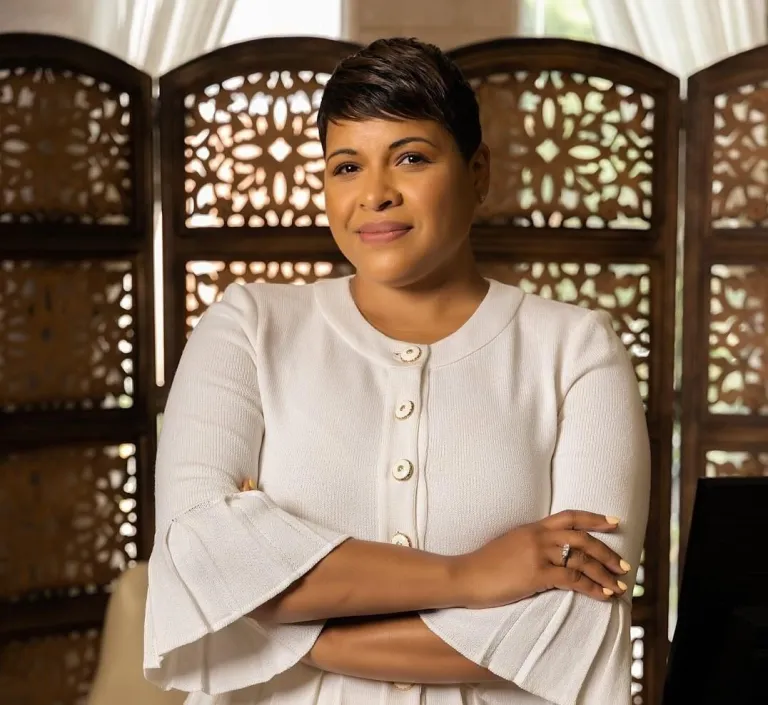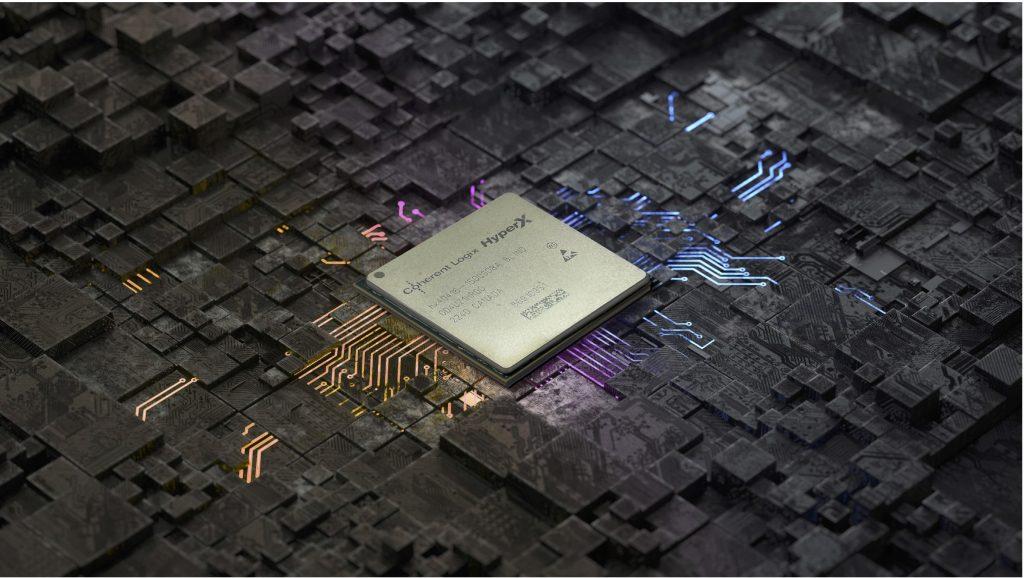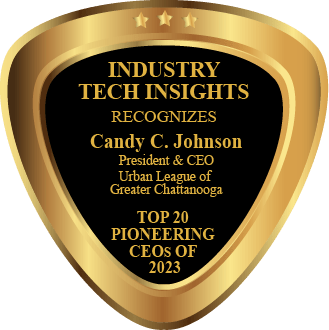
- February 24, 2026 3:53 pm
- California

Before taking on the helm of the Urban League of Greater Chattanooga as its first female President and CEO, Candy Johnson served in a variety of leadership roles. Ranging from being the youngest-ever elected City Council member in her hometown at the age of 25 years old, to running a successful non-profit education foundation, serving as policy director at a Chamber of Commerce, to senior advisor to the Mayor of Chattanooga, and as an independent consultant for non-profits and business organizations. She has remained consistent and masterful at integrating past knowledge and experiences to solve present problems. She is what some in academia would consider a “boundary spanner,” civic ‘entrepreneurs of power’ who understand coupling, interdependencies and strategically utilizing networking skills and judgments with an emphasis on the importance of cultivating interpersonal relationships, communication, political skills, and an appreciation of the interdependencies around the structure of problems and their potential solutions. Other research around the notion of boundary spanners would suggest someone with Candy’s attributes as ‘catalysts who bring together problems and solutions that otherwise would bubble chaotically in the conventional currents of modern policy streams’ (deLeon 1996, p. 508).
Her intuitive and entrepreneurial thinking has shaped her leadership style where traditional organizational norms only serve as a springboard for new opportunities to improve organizational outcomes – and where a “people first” approach is the driver of necessary change. Her quest to understand systems vs. problems in isolation has shaped her decision making methodology to find effective solutions for change.
She is a “civic entrepreneur” who sees the improvement in the quality of life for disadvantaged persons as the unrealized potential for communities to thrive.
Overcoming Obstacles
According to Candy, women of color face compounded issues of both race and gender bias throughout their careers– and historically, there have been fewer women and, more specifically, women of color in key leadership roles within organizations adding to the challenges that Candy experienced on her career journey, lack of representation and support systems to accelerate the advancement of women of color in leadership. While Candy has been in leadership roles since her college days at Austin Peay State University, progression did not come without challenge. Recent research highlights the difficulties compounded for women in the workplace (McKinsey) and those of Black women in the workplace.
McKinsey research (Women in the Workplace 2021) suggests that Black women are far more likely than other employees to be coping with the impact of racism and racial trauma. Some of their findings highlight that not only do women of color still face higher rates of microaggressions, they also still lack active allies. Women who are “Onlys”—often one of the only people of their race or gender in the room at work—have especially difficult day-to-day experiences. Their successes and failures are often put under a microscope, and they are more likely to encounter comments and behavior that leave them feeling othered, excluded, and reduced to negative stereotypes.”
“Throughout a large part of my career I’ve experienced bias on three fronts; racial, gender and age bias, often being the youngest leader in the room. Fortunately, along the way there have been a couple of male allies and mentors in my corner in the absence of women in position who helped to elevate me professionally and within community leadership roles,” she explains. “Having this type of social capital and ultimate sponsorship from my male mentor was a large part of my career success. The current position that I’m blessed to serve in now came about through a relationship that I had from when I was working as an independent consultant and a female community leader in whom I had led a project for, an ally, championed my work as a thought leader, problem solver and the overall skill set I possessed was shared with my predecessor. This led to my working with the Urban League initially as a consultant.”
Facing the challenges of racial and gender bias has made Candy more sensitive to the fact that all women, especially women of color, need opportunities to learn, grow, serve and the influence of power brokers and leaders of all backgrounds to help build relationships (social capital) in order to thrive.
Becoming A Mentor
The Urban League as an organization has been a leader in entrepreneurship development for women and people of color in a variety of ways, beyond providing a platform and a space for women to excel, but also through programs like their executive leadership development program, Inclusion by Design which prepares women and people of color with the knowledge and skills to excel in an executive assignment. In addition, out and from an entrepreneurial standpoint, our Next Level Business Accelerator has also focused on developing women and people of color to achieve business success.
“On a personal note, I have served as both a formal and informal mentor to women and ensure that they are strategically connected to the right people and environments that will help them to thrive,” adds Candy. “I try to help women who lack confidence see that they are capable and provide the opportunity for them to learn and grow within a supportive environment.” When this happens, women often find their voice and courage to do even greater things. Helping women use their innate leadership abilities in the workplace and community should be cultivated more.
Candy is a servant leader who models excellence and expects team members to see themselves as leaders regardless of their position within the organization. She believes that everyone can lead from where they are and should. She encourages a culture of curiosity and collaboration — working cross-functionally to learn about other areas of the organization outside of one’s specific area of expertise to gain new perspectives about their overall work and how everyone’s contributions impact the overall organization’s mission.
As a “people first” thinker, she believes a good leader understands how everyone in an organization impacts its mission. Making sure people know their impact on that is important.
Building A Brand
The Urban League of Greater Chattanooga (ULGC) is an affiliate of the National Urban League, the nation’s oldest and largest community-based movement founded in 1910 devoted to empowering African Americans, other ethnic minorities, and disadvantaged persons to secure economic self-reliance, parity, power, and civil rights to live a better quality of life.
Within her first year as president and CEO, Candy led the charge to produce its inaugural State of Black Chattanooga report which focused on the conditions of the Black population in Chattanooga and Hamilton County. Candy explained, “Moving forward we will work with leaders to use this as a starting point for addressing challenges and for thinking about the potential that accompanies a transformation in the lives of Black Chattanoogans — with a view toward a city with parity, equity, and shared opportunity, where ‘moving the needle’ is achievable.”
Realizing that the disparities between African-Americans and other ethnicities in Chattanooga continue to grow apart—especially on the forefronts of education, economics, and health—the Urban League of Greater Chattanooga launched three new empowerment centers in 2021 to streamline programming and services for an integrated services delivery model to help families move from merely surviving to thriving. The Center for Education, Workforce, and Family Empowerment, Center for Economic and African American Business Success, and the Center for Equity and Inclusive Leadership are all designed to meet the emerging needs of people of color and disadvantaged persons to foster greater economic prosperity and power.
“We are a non-profit organization that operates like a business — where the profit goes back into the people that our mission was created to serve — and ultimately because of our work we are contributing to a more equitable and inclusive future for our city,” elucidates Candy. “We will continue to grow as a leader in economic development and work on breaking down the barriers of systemic and institutional racism to build bright economic futures for those we serve. We will scale our efforts and build stronger partnerships, inviting others to the table that we are building—not for the institution, but for the people. We will be drivers of change for equity!”

The Unique Solutions
The company offers powerful Systems on Chips (SoCs) and a software suite for creating customized solutions. And the current flagship is HyperX Midnight, a radiation-hardened supercomputer class SoC designed for use in LEO, MEO, and GEO (low-, middle-, and geosynchronous earth orbit) satellites.
HyperX Midnight, soon after its release, became the most advanced space processor available, with roughly four times the computing throughput at half the power demand of competitive chips.
“This is a significant step, as performance and power consumption control the magnitude of a satellite. We put enormous performance in a small package with low power obligations, so our customers can use much smaller satellite busses (chassis) which conserves millions in launch budgets,” says Walt. Another key feature of Coherent’s HyperX multi-chip modules compared to its competitors is that its chips are C-programmable and use familiar tools and debugging processes. “The solutions can be built on our chip in about 6 months whereas competitive FPGA offerings usually require 24 months of development time using complex hardware development languages and a very difficult process called timing closure,” he adds.
Coherent Logix’s SoCs are also completely reprogrammable, even in space, and can modify tasks in less than 50ns (nanoseconds). These two elements combine to create a huge advantage. Coherent Logix can make four products in the time our competitors take to build just one, and we can continuously enhance those products even if they are in orbit around the Earth.
These attributes herald back to Coherent Logix’s patented invention: the HyperX fabric. And this fabric is common to all Coherent Logix’ chips – both Space-qualified and terrestrial – so these advantages are available whether users are building a satellite, 5G cellular, secure networks, AI platforms, or 8K video encoders. Coherent Logix has served the Space 2.0 and Defense markets for 15 years. High-performance computing (HPC) with low power draw, on-orbit programmability, and ease of modular multimodal MCM design are the keys to success in these markets according to Walt.
The Leader who Makes the Difference
Walt Gall, Ph.D. serves as CEO on Coherent Logix’s executive management team. He is a business leader who builds world-class AI teams, products, and strategic partnerships for top-tier start-ups (Saffron, Intel acquisition) and large corporations (Amazon Devices, Meta (formerly FB).
As CEO of Coherent Logix, the leader in low-power, high-performance C- programmable processors for the embedded systems market, he recently helped guide the company through a funding initiative that raised $85 million.
Under Walt’s leadership, in early 2023 Coherent Logix launched HyperX Midnight, the world’s most advanced space processor, with roughly four times the computing throughput at half the power demand of competitive chips. Coherent Logix is currently in its fourth generation of HyperX processors for Space 2.0 and Defense, Connected Devices, and Media & Communications industries. The company has been granted more than 375 patents and 125 patents are pending.
Over the past decade, Walt has held various leadership roles on executive teams, including Amazon Alexa AI, Meta’s AR/VR and AI divisions, and Intel AI, with responsibilities for annual operational planning, developing a 3-year strategy, and managing more than $500M R&D and production budgets. He led product launches on conversational AI voice assistants on industry-leading consumer and social media devices with cloud-to-edge embedded applications and the development of several enterprise decision-support AI/IOT solutions in wellness, health, hi-tech, and insurance sectors.
Walt’s leadership style is centered on the customer and making data-informed, timely decisions. This customer-centric team approach is critical as the company scales its products and continues to expand its channel partnerships. “I’m referring to our direct customers and strategic partners, our leadership team and employees, and our Board of Directors,” he adds. “We have a collective interest in growing revenue and partnering on developing and commercializing products that have a meaningful impact on society.”
Armed with this mindset, Walt and the rest of the leadership team have skillfully guided Coherent Logix into hypergrowth markets: Space 2.0, cybersecurity, connected devices, media and communications.

Towards the Future
Coherent Logix is adding a cloud-based capability for new customers, universities, and the Maker/open-source community to work with their development tools and hardware. With older von Neumann microprocessor architecture designs and today’s programmable hardware, the software development process is so tedious that it can take 24-36 months for a customer to develop a solution e.g., a WiFi router. Coherent Logix microprocessors, however, have C-programmability and use standard software development processes. They also offer a cycle-accurate simulation platform. These advantages enable Coherent Logix to build solutions in just six months and continue to reprogram or reconfigure as needed to support their product and customer roadmaps with new software-defined functions or as standards evolve. This, combined with the hardware/software co-design process the company uses to build their System on Chips (SoCs), brings the power of digital transformation to the design and use of digital processors – amplifying both the pace of innovation and the competitive advantages of Coherent Logix.
For the near future, Walt is striving towards building highly functioning, distributed teams to bring the most disruptive products to market he has worked on, i.e., a new class of low-power, reprogrammable, high-performance computing devices. Coherent Logix is enabling customers to “redefine hardware as software” (which is also the company’s tagline) to meet the market demand for the flexibility, extensibility, and scalability of software-defined hardware systems and their small SWaP requirements, ranging from space satellites to consumer devices. Coherent Logix’s HyperX architecture provides a paradigm shift in hardware-software co-design from embedded systems to the cloud and delivers a more cost-effective and scalable software-defined device strategy. With its compute and memory co-localized, an event-oriented, parallel processing fabric, low power profile, and C-programmability, this has a 2-4x improvement in the time it takes to develop and launch products. This multi-faceted value proposition extends product customer lifetime value economic models, increasing the ROI for its ODM and OEM partners and customers. Accomplishing these product revenue growths and customer-centric goals will lead naturally to the longer-term goal of positioning Coherent Logix for a successful market exit for its shareholders.
“The future requires low-power, high performance computing for next generation connected devices – it will be everywhere we find a sensor, a camera, a robot, or smart device. As large as the Space 2.0 revolution is, the terrestrial edge and embedded devices will eclipse it by orders of magnitude,” concludes Walt. “We must be as efficient with power as possible. It has a cost to our planet to produce, and it turns into heat when you use it. If we want to preserve our planet, smart everything must become smart, efficient everything.”

" While leadership development is important, sometimes women just need a boost of confidence and to be given the opportunity to lead. My goal in working with other women is to show them that they are capable of leading from where they are, help them build relationships -- and provide the opportunity for them to learn and grow within a supportive environment. "
Candy C. Johnson
President & CEO